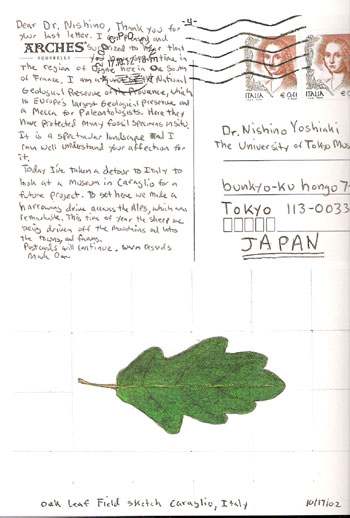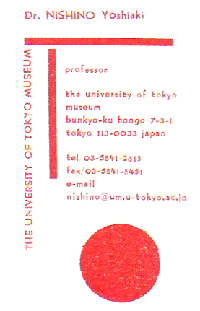Correspondences
Mark Dion & Yoshiaki Nishino
October 17th 2002
Dear Dr. Nishino,
Thank you for your last letter. I am pleased and surprised to hear that you have spent time in the region of Digne here in the south of France. I am a guest of the National Geological Reserve of Provence, which is Europe's largest geolpgical preserve and a Mecca for paleontologists.
Here they have protected many fossil specimens in situ.
It is a spectaculous landscape and I can well understand your affection for it.
Today I've taken a detour to Italy to look at a museum in Caraglio for a future project.To set here we make a harowing drive across the Alps, which was remarkable.
This time of year the sheep were driven off the mountains and into the towns and farms.
Postcards will continue.
Warm regards
Mark Dion

November 11th 2002
Dear Mark, You must have been tired when you arrived home after the two
days in Tokyo. In Japan, we call such a brevissima round trip a "tonbo-kaeri,"
meaning literally a "dragonfly return," or, to come back to where you
started from as quickly as a dragonfly darts here, there, and back again.
Thank you very much for your lecture, which was very exciting. I think
the audience understood not only your position as an activist, taking
an interest in the environmental mechanisms at work in diverse sites,
but also your intellectual methodology for representing them as spectactul
arassemblages of diverse objects. You underlined the essential point in
your answer to a question by one of our museum staff, when you pointed
out that while a scientist should look for the truth, an artist is not
always obliged to tell it; you have neither wanted to be a scientist,
nor conducted yourself as one. I took much pleasure from your statement.
Today's science, even scientific thinking in the general meaning of the
word, seems to me utterly bound to "ratio"(logical analysis). Scientists
are deprived of an "imaginatio" which might help them observe the real
world as it is physically and represent it allegorically. This is particularly
the case for those who belong to so-called academic societies. I think
it is extremely important to be an artist free from such academic restraints.
I am convinced that our project can contribute in some small way to liberate
obstinate academicians from their narrow perspective and to understand
the importance of artistic imagination and creativity.
We are all looking forward to hearing from you soon.
Best wishes,
Sincerely yours,Yoshiaki NlSHINO
